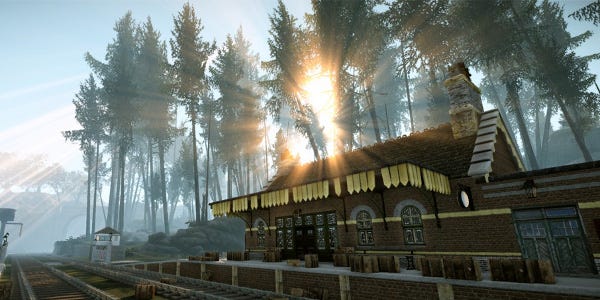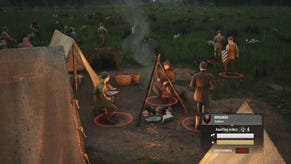Dear Succesther: Everybody's Gone To The Rapture
Dear Esther's brilliantly amorphous plot made me feel like I'd hit my head and - for the same reason that television's left me deathly afraid of light flicks on the forehead or especially hard rainfall - acquired horribly debilitating amnesia. That, however, is probably where the similarities between Amnesia: A Machine For Pigs and Dear Esther end, so thechineseroom's also giving its more experimental spirit room to breathe with Everybody's Gone To The Rapture. It is, of course, about the end of the world - as these things so often are. But this is far from typical videogame pre/post/postmodern apocalypse fare.
Speaking with Beefjack, thechineseroom's mightiest creative lord, Daniel Pinchbeck, explained the general concept behind his company's CryEngine-3-powered opus, describing it as - in some ways - Dear Esther's polar opposite. While you can certainly stand around and simply experience the six main characters' final hour, the idea is to interact in different ways each playthrough and watch the dominoes fall. Pinchbeck explained:
"Do you become like a voyeur, just watching them live out the last day of their life, effectively? They’ll get on with that anyway, and what they do will make changes in the world. And if you’re there when that change happens, that’s kind of realised and presented in a different way than if you’re not there.”
"We’re looking at making it much more physially interactive [than Dear Esther], so you can manipulate objects, you can open and close doors. [And] without it being too much like easter egg rewards, the game will reward you for exploring and interacting. So there are places which are not obvious to get to, and you have to do things in order to get to them."
The crux, then, is that one hour time limit. Once the clock strikes armageddon, the bell tolls for, well, existence, and that's the end of your playthrough. Then you play again and again and again - discovering entirely new things each time. This is aided by the fact that the environment's enormous (it'd take 20 minutes to just walk from one end to the other, Pinchbeck says), so doing everything in one go is beyond impossible.
It all sounds very interesting, and if anyone can realize such an ambitiously experimental vision, it's thechineseroom. Currently, Pinchbeck and co are aiming for a summer 2013 release date - though many key aspects of the game are still in flux right now. So who knows? Honestly, though, Dear Esther's probably one of my favorite anythings of the year thus far, so I'm more than willing to wait if it means getting a second helping of food for thought that's also able to play a mean number on my heartstrings. Without spoiling too much for those who haven't played it, the ghosts, guys. Brilliant. I want the brains that thought of that to be thinking of all of the things.








